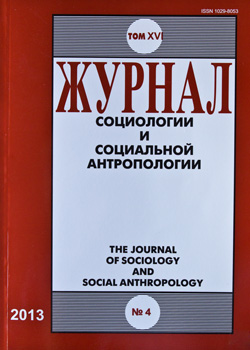Virtual Community as a Social Field: Inequality and Communicative Capital
Abstract
Structures of social inequality and new forms of power inevitably arise inside the social space within the modern Internet despite the idea that Internet is a means of free communication based on the equality of users. The influence of traditional social inequality forms is absorbed and reduced within computer-mediated communication, so we suggest a hypothesis about emergence of radically new social resource. The paper presents the approach to study a virtual community as a social field (in terms of Bourdieu theory). The aim of this study is to measure and evaluate the contribution of different types of capital to unequal distribution of power within community. The author has developed the analytical matrix of social integration types provided by different web technologies, formulated the concept of communicative capital, operationalized different types of capital in cyberspace. Finally, the author presents the results of his empirical research showing and interpreting the distribution of different types of capital between two groups of users – moderators and ordinary users.References
Барлоу Дж. П. Декларация независимости Киберпространства. 8.02.1996 / Пер. с англ.: Е. Горный. [http://www.dnn.ru/indep.htm ]. Дата обращения: 15.10.2012.
Бондаренко С. В. Социальная структура виртуальных сетевых сообществ. Ростов н/Д: Изд-во Ростовского государственного университета, 2004.
Бурдье П. Социология социального пространства / Пер. с франц.; Отв. ред. перевода Н. А. Шматко. СПб.: Алетейя, 2005.
Зиммель Г. Общение. Пример чистой, или формальной социологии // Зиммель Г. Избранное. Т. 2. Созерцание жизни. М.: Юрист, 1996. С. 486–500.
Иванов Д.В. Виртуализация общества. Версия 2.0. СПб.: Петербургское Востоковедение, 2002.
Кастельс М. Галактика Интернет: Размышления об Интернете, бизнесе и обществе / Пер. с англ. А. Матвеева под ред. В. Харитонова. Екатеринбург: У-Фактория, 2004.
Конституция Лепрозория. [http://maksimus.leprosorium.ru/Конституция_Лепрозория ]. Дата обращения: 25.10.2012.
Лепра // Интернет-энциклопедия Lurkmore. [http://lurkmore.to/Лепра ]. Дата обращения: 21.10.2012.
Луман Н. Общество общества. Книга 2: Медиа коммуникации / Пер. с нем. А. Глухов, О. Никифоров. М.: Логос, 2011.
Поправко В.Н. Закрытое Интернет-сообщество как форма коммуникации в виртуальном пространстве // Вестник Томского государственного университета. 2009. 322. С. 52–54.
Ритцер Дж. Современные социологические теории / Пер. с англ. А. Бойков, А. Лисицына. СПб.: Питер, 2002.
Розина И.Н. Виртуальные исследовательские сообщества: от зарубежных моделей к отечественным примерам // Образовательные технологии и общество. 2009. 2 (12). С. 389–408.
Рыков Ю. Г. Интернет-коммуникация: тренд современного развития // Современная социологическая методология — от теории к практике / Под ред. А.О. Бороноева. СПб.: Северная Нива, 2012. С. 251–260.
Скуратов А. Б. Локальные Интернет-сообщества крупного российского города: социально-стратификационный анализ / Автореф. дисс. … канд. социол. наук. Екатеринбург, 2009.
Стриженко А.А. Виртуальные сообщества как участники компьютерно-опосредованной коммуникации // Мир науки, культуры, образования. 2010. 3. С. 67–69.
Царева А.В. У истоков Интернета: принцип маргинальности как условие творчества // Человек и общество. Вып. 32. Ценностно-нравственные проблемы российского общества: самореализация, воспитание, средства массовой информации. СПб.: Изд-во С.-Петерб. ун-та, 2008.
DiMaggio P., Hargittai E., Neuman W. Rassel, Robinson J. P. Social Implications of the Internet // Annual Review of Sociology. 2001. 27. Pp. 307–336.
Habermas J. The Theory of Communicative Action. Vol. 1: Reason and the Rationalization of Society. Boston: Beacon Press, 1984.
Maximova O.B. Social Aspects of Internet Communication: Virtual Community and Communication Personality // Вестник Российского Университета Дружбы Народов. Сер. Социология. 2011. 1. С. 24–33.
Rainie L, Wellman B. Networked: The New Social Operating System. Cambridge, London: The MIT Press, 2012.
Reid E. Hierarchy and power: social control in cyberspace // Communities in cyberspace. Smith M. A., Kollock P. (Eds.) N.Y.: Routledge, 1999. Pp. 107–133.
Rheingold H. The Virtual Community: Homesteading on the Electronic Frontier. 1993. [http://www.rheingold.com/vc/book/intro.html ]. Дата обращения: 15.10.2012.
Shaw A. Centralized and decentralized gatekeeping in an open online collective // Politics and Society. 2012. 40 (3). Pp. 349–388.
Van Laer J. Activists online and offline: The Internet as an information channel for protest demonstrations // Mobilization. 2010. 15 (3). Pp. 347–366.
Wellman B. Physical place and cyberplace: The Rise of Personalized Networking // International Journal of Urban and Regional Research. 2001. 25 (2). Pp. 227–252.

